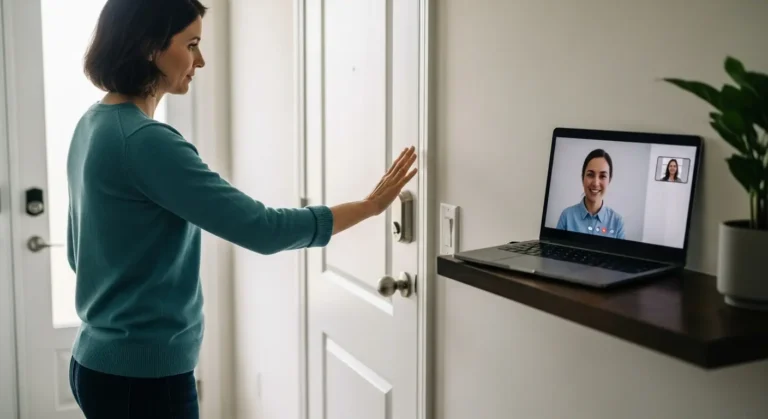Finding the Best OCD Therapist in Toronto: A Complete Guide
Searching for the right OCD therapist can feel overwhelming when you’re already struggling with intrusive thoughts and compulsions. This comprehensive guide will help you find a qualified OCD specialist in Toronto who can truly help you reclaim your life.
If you’re reading this, you’ve likely reached a point where OCD is significantly impacting your daily life. Maybe you’re spending hours checking locks, or intrusive thoughts are making it hard to concentrate at work. Perhaps a family member suggested therapy, or you’ve finally realized that what you’re experiencing isn’t just “being particular” – it’s a real mental health condition that deserves professional care.
Finding the right therapist is one of the most important decisions you’ll make in your recovery journey. Studies have shown that it takes an average of 14-17 years for an individual with OCD to find effective treatment – but it doesn’t have to take that long for you.
Why Finding an OCD Specialist Matters
Not all therapists are trained to treat OCD effectively. While traditional talk therapy can be helpful for many mental health conditions, there is no research evidence that it is effective in treating OCD. This is why finding a therapist who specializes in evidence-based OCD treatment is crucial.
The Training Gap
Many therapists have never received in-depth training in Cognitive Behavioral Therapy (CBT) and Exposure and Response Prevention (ERP) for OCD, even though some therapists have been practicing for years. This has created a severe shortage of professionals adequately trained in the most effective treatment for OCD.
What Makes a Great OCD Therapist
The best OCD therapists in Toronto share several key characteristics:
- Specialized training in evidence-based treatments like ERP and CBT
- Significant experience treating OCD specifically (not just general anxiety)
- Willingness to be flexible in their approach and treatment locations
- Understanding of different OCD presentations including “Pure O” and less common subtypes
- Collaborative approach that empowers you to become your own therapist over time
Essential Questions to Ask Potential OCD Therapists
Before committing to any therapist, it’s important to interview them. If the therapist is guarded, withholds information, or becomes angry at your requests for information, you should probably look elsewhere.
Question 1: “What techniques do you use to treat OCD?”
What you’re looking for: They should mention Cognitive Behavioral Therapy (CBT), Exposure and Response Prevention (ERP), or other evidence-based treatments. If the therapist is vague or doesn’t mention these approaches, use caution.
Red flag: Vague answers or focus solely on traditional talk therapy approaches.
Question 2: “What is your training and background in treating OCD?”
What you’re looking for: Therapists who have attended specialized workshops or trainings, particularly those offered by the International OCD Foundation (IOCDF) like the Behavior Therapy Training Institute (BTTI) or Annual OCD Conference.
Good signs:
- Member of the International OCD Foundation (IOCDF)
- Member of the Association for Behavioral and Cognitive Therapies (ABCT)
- Attendance at specialized OCD workshops and conferences
Question 3: “How much of your practice currently involves OCD?”
What you’re looking for: A good answer would be over 25%, as this likely means they have a specialty in working with OCD. However, don’t let a lower percentage prevent you from seeing them if they answer your other questions satisfactorily.
Question 4: “Are you willing to leave your office if needed to do exposure work?”
What you’re looking for: The answer should be “Yes.” It is sometimes necessary to go out of the office to do effective ERP. If they say “No,” ask them “How come?” to understand their limitations.
Question 5: “What is your attitude towards medication in the treatment of OCD?”
What you’re looking for: While not everyone needs medication, they should have a balanced, evidence-based perspective. If they are negative about medication, this is a bad sign, as medication can be a very effective treatment for OCD when appropriate.
Question 6: “Do you include families in any of the treatment?”
What you’re looking for: OCD can be very isolating and often impacts the entire family. The therapist should be open to including family members as part of the treatment plan and team.
What to Look for in the Best OCD Therapist in Toronto
Specialized Credentials and Training
Look for therapists who have:
- Master’s or Doctoral degrees in psychology, social work, or counseling
- Active licenses (RSW, RP, C.Psych)
- Specific training in ERP and CBT for OCD
- Membership in professional organizations focused on OCD treatment
Experience with Your Specific OCD Type
OCD presents differently for everyone. The best OCD specialists understand various presentations including:
- Contamination OCD: Fear of germs, illness, or “dirty” objects
- Checking OCD: Repeatedly checking locks, appliances, or safety
- “Pure O”: Mental compulsions without visible rituals
- Symmetry/Just Right: Need for perfect order or balance
- Harm OCD: Intrusive thoughts about causing harm
- Religious/Moral OCD: Scrupulosity concerns
- Relationship OCD (ROCD): Doubts about romantic relationships
Evidence-Based Treatment Approach
The gold standard for OCD treatment is Exposure and Response Prevention (ERP) therapy. This approach involves:
- Gradual exposure to anxiety-provoking situations
- Response prevention – resisting the urge to perform compulsions
- Habituation – learning that anxiety naturally decreases without compulsions
The best OCD therapists will also integrate other evidence-based approaches like:
- Acceptance and Commitment Therapy (ACT)
- Mindfulness-based techniques
- Cognitive restructuring
Spotlight: Laura Davidson at Mental Wellness and Me

When looking for the best OCD therapist in Toronto, Laura Davidson, MSW, RSW exemplifies many of the qualities you should seek in an OCD specialist.
Her Qualifications
- Master of Social Work (MSW) with specialized mental health training
- Registered Social Worker (RSW) in good standing
- Provincial registrations with Ontario College of Social Workers and Social Service Workers
- Evidence-based approach focused on empowerment and practical strategy development
Her Approach to OCD Treatment
Laura’s therapy philosophy aligns perfectly with effective OCD treatment principles:
- Person-centered care tailored to your unique OCD presentation
- Empowerment-based therapy that builds tools for life challenges
- Safe, understanding environment where you can explore difficult thoughts without judgment
- Goal-oriented therapy focused on taking meaningful steps toward your desired life
You can learn more about Laura’s background and approach on the About Us page.
Specialized OCD Services
Mental Wellness and Me offers comprehensive OCD therapy that includes:
- Virtual therapy options for accessibility across Ontario
- Flexible scheduling with evening and weekend availability
- Insurance coverage accepted for most Extended Health Benefit plans
- No referral required for direct access to care
Treatment Approaches to Look For
Exposure and Response Prevention (ERP)
The most effective OCD therapists will be well-versed in ERP therapy. Here’s what good ERP treatment should include:
Psychoeducation: Understanding the nature of OCD and how it affects your thoughts and behaviors. You’ll also learn why ERP is effective.
Trigger Identification: Recognizing the situations, objects, or thoughts that trigger your obsessions and compulsions.
Hierarchy Development: Creating a list of triggers ranked by intensity, starting with those that cause mild anxiety and working up to more challenging ones.
Response Prevention: Practicing resisting or delaying compulsions after facing a trigger.
Exposure Exercises: Gradually facing anxiety-provoking situations or thoughts without engaging in compulsive behaviors.
What Good ERP Therapy Looks Like
- Collaborative planning: Your therapist works with you to develop exposures, not forcing you into situations you’re not ready for
- Graduated approach: Starting with easier challenges and building up to more difficult ones
- Real-world practice: Conducting exposures in environments where your OCD actually occurs
- Between-session support: Ongoing guidance and encouragement as you practice skills
If you’re wondering about the time commitment, check out our guide on how many therapy sessions you really need.
Red Flags to Avoid
Therapists Who Focus Only on Talk Therapy
If a therapist suggests only talking about your problems without incorporating behavioral techniques, this is not evidence-based OCD treatment. While insight can be helpful, research shows that ERP is essential for OCD recovery.
Unrealistic Promises
Be wary of therapists who:
- Promise quick fixes or “cures”
- Suggest that medication is never necessary
- Don’t understand the chronic nature of OCD
- Focus solely on symptom elimination rather than management
Lack of OCD-Specific Knowledge
Some warning signs include:
- Calling OCD “just anxiety”
- Not understanding different OCD subtypes
- Suggesting that you can simply “stop thinking” certain thoughts
- Unfamiliarity with current research on OCD treatment
Finding OCD Specialists in Toronto: Resources
Professional Directories
International OCD Foundation (IOCDF) Directory: The IOCDF maintains a directory of mental health professionals who have specialized training in OCD treatment.
Psychology Today: Filter for therapists who specialize in OCD and use evidence-based treatments.
Ontario College of Social Workers: Search for registered social workers with OCD specializations.
Questions About Accessibility
Virtual vs. In-Person Treatment
Many excellent OCD therapists now offer virtual sessions, which can be just as effective as in-person treatment. Research shows that virtual ERP therapy is as effective as face-to-face treatment.
Benefits of virtual OCD therapy:
- Access to specialists regardless of location
- Ability to do exposures in your actual environment
- Greater scheduling flexibility
- No commute time or parking costs
Mental Wellness and Me offers both approaches, allowing you to choose what works best for your lifestyle and preferences.
Insurance and Cost Considerations
Insurance Coverage: Most Extended Health Benefit plans cover therapy sessions with registered professionals. Always verify coverage before starting treatment.
Cost vs. Value: While cost is a consideration, remember that effective OCD treatment is an investment in your quality of life. The right therapist can help you save years of struggle.
Payment Options: Look for therapists who offer flexible payment arrangements or sliding scale fees if needed.
Related Mental Health Concerns
OCD rarely exists in isolation. The best OCD therapists also understand related conditions that often co-occur:
Anxiety Disorders
Many people with OCD also struggle with general anxiety, social anxiety, or panic disorder. Look for therapists experienced in treating anxiety disorders.
Depression
OCD can be exhausting and often leads to feelings of hopelessness. Quality depression treatment that understands the OCD connection is important.
Emotion Regulation Challenges
Learning to tolerate difficult emotions without using compulsions is a key skill. Therapists who offer emotion regulation therapy can be particularly helpful.
Life Transitions
OCD symptoms often worsen during major life changes. Consider therapists who understand life transitions therapy if you’re dealing with significant changes.
The Therapeutic Relationship: Why It Matters
Beyond Credentials
While training and experience are crucial, the therapeutic relationship is equally important. You should feel:
- Heard and understood when discussing your symptoms
- Respected for your experiences and challenges
- Hopeful about your potential for recovery
- Supported as you face difficult exposure exercises
Cultural Considerations
Ask potential therapists: “Have you received cultural competence training or taken courses on issues surrounding race, ethnicity, or culture?” This is particularly important if you belong to a marginalized community or have specific cultural considerations.
Building Trust
Remember that effective ERP therapy will ask you to do things that feel uncomfortable. You need to trust your therapist’s guidance and expertise. This is why the initial consultation is so important.
What to Expect in Your First Sessions
Initial Assessment
A qualified OCD therapist will:
- Conduct a thorough assessment of your symptoms
- Ask about your history and how OCD impacts your daily life
- Explain their treatment approach and what to expect
- Answer all your questions about the therapeutic process
Treatment Planning
Together, you’ll:
- Identify your specific OCD triggers and compulsions
- Develop treatment goals that matter to you
- Create a hierarchy of exposure exercises
- Establish a treatment schedule that works for your life
Early Sessions
Initial therapy sessions typically focus on:
- Understanding how OCD works in your brain
- Learning about the exposure and response prevention process
- Starting with easier exposure exercises
- Building confidence and motivation for harder challenges
Supporting Your Recovery Journey
Family Involvement
OCD affects entire families, not just individuals. The best therapists understand how to:
- Help family members understand OCD
- Reduce family accommodation of compulsions
- Support healthy family dynamics during recovery
Between-Session Support
Look for therapists who offer:
- Check-ins between sessions
- Clear instructions for practicing exposures
- Resources for continued learning about OCD
- Crisis support when needed
Making Your Decision
Trust Your Instincts
After interviewing potential therapists, consider:
- Did they answer your questions thoroughly and confidently?
- Do you feel comfortable with their approach?
- Are they knowledgeable about your specific type of OCD?
- Do you feel hopeful about working with them?
Starting Treatment
Once you’ve chosen a therapist:
- Be honest about your symptoms and concerns
- Ask questions when you don’t understand something
- Commit to doing the work, even when it feels difficult
- Remember that recovery is a process, not a destination
Additional Resources for OCD Support
Educational Materials
- International OCD Foundation: Comprehensive information about OCD and treatment
- Mental Wellness and Me Blog: Regular articles about OCD and perfectionism, anxiety management, and building stronger relationships
Support Groups
- Toronto OCD Support Group: Peer-led meetings for adults and children with OCD
- Online communities: Virtual support groups for when in-person meetings aren’t accessible
- Family support groups: Resources for loved ones of people with OCD
Crisis Resources
If you’re having thoughts of self-harm:
- Crisis Services Canada: 1-833-456-4566
- Toronto Distress Centre: 416-408-4357
- Emergency Services: 911
Taking the Next Step
Finding the best OCD therapist in Toronto doesn’t have to be overwhelming. By knowing what to look for and asking the right questions, you can find a qualified professional who will support your recovery journey.
Ready to Start Your Search?
If you’re looking for an experienced, compassionate OCD specialist who offers evidence-based treatment, consider reaching out to Laura Davidson at Mental Wellness and Me.
Contact Information:
- Email: [email protected]
- Online Booking: Schedule through Jane App
- Website: Mental Wellness and Me
What Makes Mental Wellness and Me Different
- Virtual accessibility across all of Ontario
- Flexible scheduling including evenings and weekends
- Insurance accepted for most Extended Health Benefit plans
- No referral required for direct access to care
- Empowerment-focused approach that builds long-term skills
Frequently Asked Questions
How do I know if I really have OCD? If intrusive thoughts and repetitive behaviors are taking up significant time (more than an hour daily) and interfering with your life, work, or relationships, it’s worth getting a professional assessment. Check our FAQs page for more detailed information.
How long does OCD therapy typically take? This varies depending on your specific situation and how much you put into your ERP exercises. Many people see significant improvement within 12-20 sessions, though some may need longer-term support.
Will I need medication for OCD? Not everyone with OCD needs medication. Your therapist can help you understand whether medication might be helpful in your specific case and can coordinate with your family doctor if needed.
Can OCD be completely cured? While there’s no single “cure” for OCD, it is highly treatable. Most people can learn to manage their symptoms effectively and live fulfilling lives with the right treatment and support.
What if virtual therapy doesn’t work for me? Mental Wellness and Me offers flexible options and can work with you to find the approach that works best. Many people find virtual therapy surprisingly effective, but if you need in-person support, they can help you find appropriate resources.
Your Recovery Starts Today
Remember: OCD is not your fault, but recovery is possible. The right therapist can help you reclaim your life from intrusive thoughts and compulsions. Studies show that with proper treatment, most people with OCD can achieve significant improvement in their symptoms and quality of life.
You deserve to live a life free from the constant anxiety and time-consuming rituals that OCD demands. The first step is finding a qualified therapist who understands your struggle and has the skills to guide you toward recovery.
Don’t let another year pass struggling with OCD symptoms. Take the first step today by reaching out to a qualified OCD specialist in Toronto. Your future self will thank you for having the courage to seek help.
Mental Wellness and Me provides virtual mental health services across Ontario, Canada. This guide is for educational purposes and does not replace professional medical advice. If you’re experiencing a mental health emergency, please contact your local emergency services immediately.




